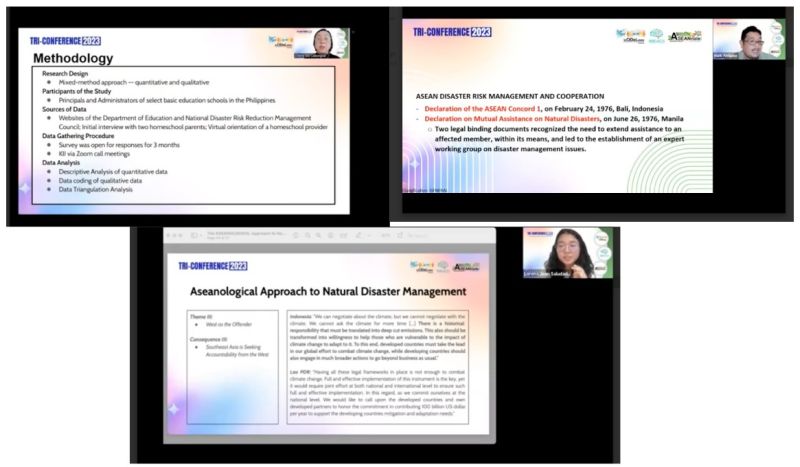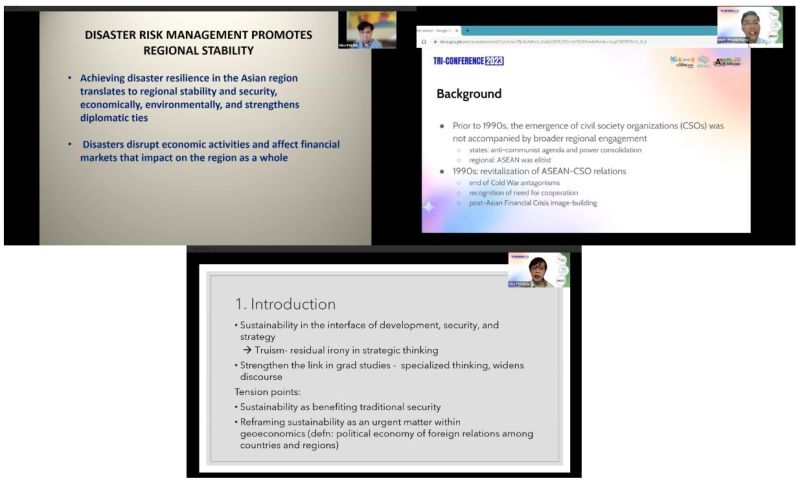Three parallel sessions focusing on the areas of sustainability, culture, education, and health and gender, were featured during the Online International Symposium on ASEAN studies (ISAS) as part of the ASEANnale 2023, 24 August 2023, from 1:30 pm to 4:30 pm via Zoom.
Six papers on sustainability were highlighted on the first set of parallel sessions. Three research papers centered on disaster risk management were presented during the session moderated by Asst. Prof. Celeste Tayzon, faculty member from the Faculty of Education.
In her study titled “Risk communication integration to online distance learning (ODL) as a disaster risk reduction (DRR) strategy among basic education private schools in the Philippines”, Ms. Cheri Glo S. Cabungcal, UPOU Doctor of Communication student, discussed the possibility of integrating risk communication into online distance learning modality. Ms. Lorena Jean Saludadez, Master of ASEAN Studies lecturer, uncovered the themes arising from the natural disaster responses of the 10 ASEAN member states (AMS) in her study titled “The Aseanological Approach to Natural Disaster Management: A Discourse Analysis of AMS Speeches Performed in Intergovernmental Fora and Conferences. Prof. Mark John V. Antipino, in his paper titled Enhancing ASEAN’s Immediate Disaster Management Response: Lessons learned from Super Typhoon Haiyan/Yolanda, discussed the assistance provided by the ASEAN member states during the onslaught of typhoon Haiyan/Yolanda and identified possible recommendations in enhancing ASEAN’s disaster risk management.

Ms. Cheri Glo Cabungcal (upper left), Prof. Mark John Antipino (upper right), and Ms. Lorena Jean Saludadez presented their research papers on sustainability
Still in line with the topic of sustainability, three research studies were presented in a concurrent session moderated by Asst. Prof. Karl Abelard Villegas of the Faculty of Management and Development Studies.
Dr. Tina S. Clemente, Associate Professor at the Asian Center, University of the Philippines Diliman, delved on reframing sustainability as an urgent matter within geoeconomics, in her paper titled “Sustainability as a Geoeconomic inquiry in Philippine Studies.” In his study titled “Promoting indigenous peoples as agents of sustainability in ASEAN-CSO engagements” Asst. Prof Mark Vincent J. Nogra from West Visayas State University, sought to showcase how IP CSOs (Civil Society Organizations) promote the image of indigenous peoples (IP) to ASEAN. Asst. Prof. Alexander Michael G. Palma from the Asian Center of the University of the Philippines-Diliman, examined the regional cooperation arrangements in Asia, particularly in the area of disaster risk management and prevention, in his study titled “Disaster-resilience in Asian Regional Cooperation: An Emerging Economic Diplomacy.”

Cultural-related research papers and studies on education were highlighted during the second set of parallel sessions, moderated by Dr. Maripres U. Sarinas, Faculty Secretary of the Faculty of Management and Development Studies, and Dr. Dennis Ybanez from the Faculty of Education, respectively.
In a study titled “Unlocking the Potential of Malaysian Traditional Poetry in Malaysia’s Cultural Heritage: From Tradition to Sustainability”, Mr. Cheng Keat Oo from the Open University Malaysia, identified the heritage elements of “pantun”, Malay traditional poetry, and investigated its potential as a tool for promoting values of sustainable development. For the second presentation, Asst. Prof. Roda Tajon, faculty member of the Faculty of Information and Communication Studies, shared her critical paper on the recipe book titled Heirloom Recipes of the Cordillera through her study titled “Food and Nation: Delving into the Nation in the Heirloom Recipes of the Cordillera”. Mr. Rico Macawili, in his paper titled “ASEAN is slow? Prove it Empirically” aimed to provide empirical information on the perceived “slow” phase of ASEAN and identify its academic and pragmatic value.
Mr. Joven Albert Castillo from Batangas State University (BSU) presented the contribution of BSU to the education innovation in the ASEAN through his paper titled “University of Innovations: The Contributions of Batangas State University to the Education Innovation in ASEAN”. In his paper titled “Missed opportunities: Parents’ perspective on the unresolved dropout problem among Orang Asli students”, Dr. Huey Siew Wong from the Open University Malaysia, analysed the Orang Asli (a minority group in Malaysia) parents’ views on the reasons behind the high dropout rate of their children despite interventions. UP Diliman Prof. Rosella Moya – Torrecampo identified the strategic responses useful in implementing education contingenicies in her study titled “Reflections on Traditional and Technology-based Adaptive Teaching-learning strategies towards Learner Prevalence in Contingencies.”

For the third set of parallel sessions, additional papers focusing on education were presented. Asst. Prof. Joel De Castro from the Faculty Education moderated the session.
In a study titled “A ‘Tambayayong’ Approach to the Digital Divide”, Mr. Froilan Adrielle Cariaga and Mr. John Magnifico shared a community-based sustainable application of technology towards equity in education particularly in rural areas in Masbate, Philippines. Additionally, Dr. Leo Mendel Rosario presented in their research titled “Perspectives on Innovation Through Learning and Work in the Technical Vocational Education (TVET) and Training in the Philippines”, gaps were identified in the 4IR (4th Industrial Revolution Skills) in Philippine TVET.
Three papers on health and gender were also discussed in the third set of parallel session moderated by Dr. Myra Oruga, Program Chair of Master of International Health and Assistant to the Vice-Chancellor for Academic Affairs.
Ms. Patrianne Padua and Dr. Maria Benita Balagan identified the social and work-related factors that define the mental health conditions of women and men in Cagayan State University amids the COVID-19 pandemic in their study titled “Social and Work-related Correlates of Mental Health Conditiions during the COVID-19 pandemic among the women and men employees of CSU: A Basis for Mental Health Program”. In a study titled “Perceived Stressors of Filipinos in South Korea and the Development of an Appreciative Resilience-focused Wellness Program”, Dr. Monica Walet from the National Teacher Training Center for Health Professions, investigated the factors that affect the well-being of the Filipinos in South Korea. Ms. April Rose Nalangan’s paper titled “Navigating Gendered Waters: The Role of ASEAN Framework in Protecting and Promoting Women Seafarer’s Rights in the Maritime Industry”, focused on identifying how ASEAN regional frameworks address the gender issues of women seafarers in the Philippines, Indonesia and Singapore.
ASEANnale 2023 is a composite of activities that showcases the creative and research works of higher education students and faculty from the 10 ASEAN countries. ASEANnale 2023 is part of the Tri-conference 2023 held from 21 to 25 August 2023, organized by UPOU in collaboration with the Southeast Asian Regional Center for Graduate Study and Research in Agriculture (SEARCA), UPOU Foundation, Inc. (UPOUFI), and the Philippine Society for Distance Learning (PSDL).
The Tri-conference includes the ICODEL 2023, International Symposium on Education and AI Convergence (ISEAC 2023), and the ASEANnale, which share the same theme: Sustainability in Education: Intersections, Ideation, Innovations. Tri-Conference is sponsored and supported by Concentrix (Platinum Sponsor), Near-Life, Development Bank of the Philippines and Nephila Web Technology, Inc (Gold Sponsors), and the following Exhibit Partners: Digital Freedom Network, Disini Law, Veterans Bank, Land Bank, DOST-PCAARRD.
Written by Tri-Conference 2023 Publicity Committee








